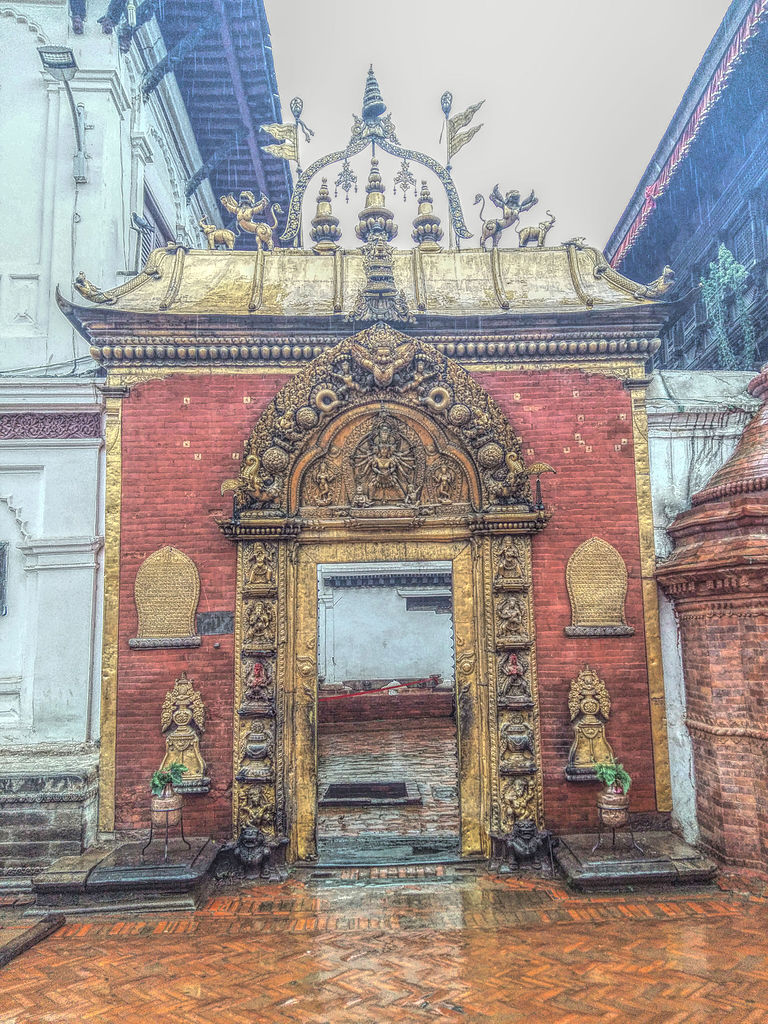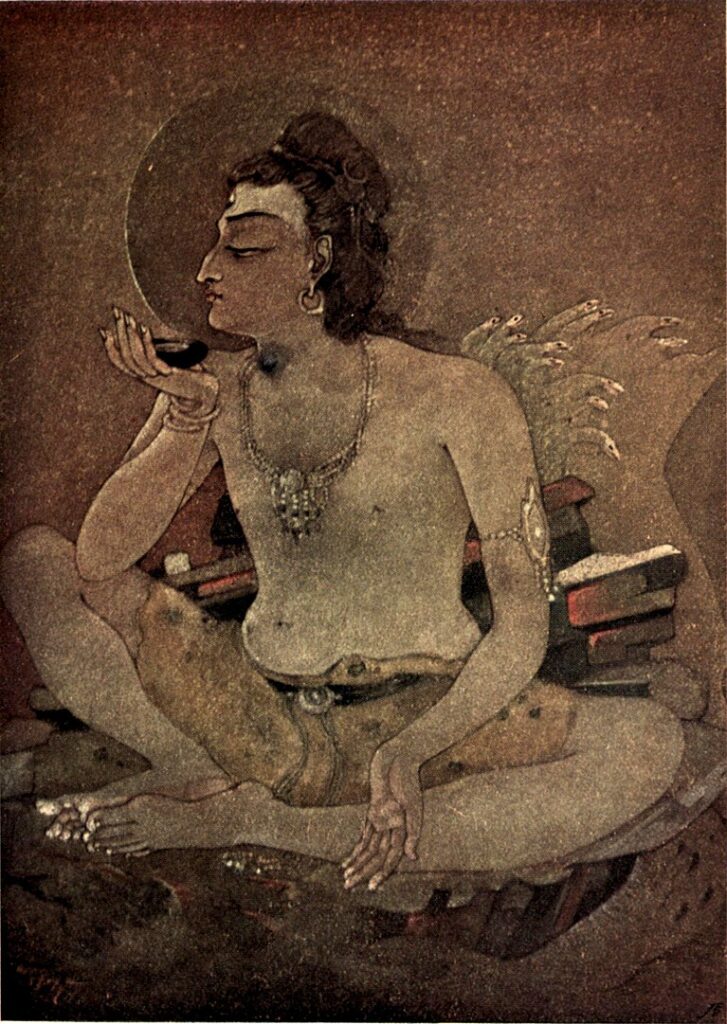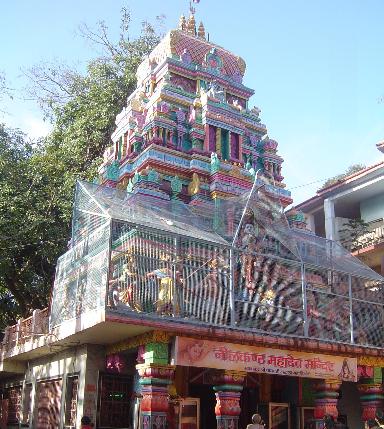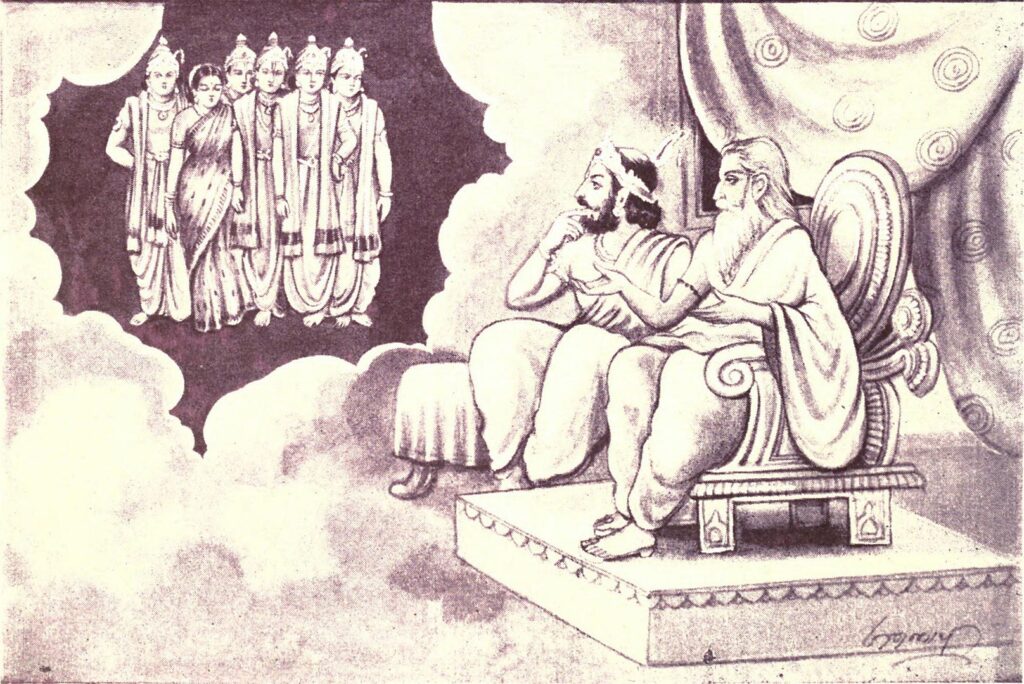
Table of Contents (Complete Mahabharata in Simple English)
Previous Post: How Aruna Shielded the Earth From Surya’s Wrath
| Note: In the previous post, we read about how Garuda’s brother, Aruna, saved the earth from Surya’s wrath. In this post, we will read about how Vinata and Garuda served Kadru and her son’s by taking them on their backs to a charming island in the middle of the ocean, and what happened when Garuda soared high in the sky with the snakes on his back. |
After appointing his elder brother, Aruna, as Surya’s charioter, Garuda, filled with great strength and energy and capable of traveling to any place at will, went to his mother who was on the other side of the great ocean with Kadru and her Snake sons.
On the other side of the ocean, Garuda’s mother, Vinata, had been enslaved by her sister Kadru, and lived the life of a slave.
Garuda saw his mother Vinata prostrate in front of Kadru when she was called. Kadru said, “There is a delightful place in the middle of the ocean that’s inhabited by the nagas. Take me there.”
Hearing Kadru’s command, Vinata bore her sister on her shoulders and asked Garuda to allow Kadru’s snake sons on his shoulders.
With the snakes on his shoulders, Garuda, the ranger of the skies, started ascending towards the sun. As he ascended, the sun’s rays started scorching the snakes, putting them in distress and danger. When Kadru saw her sons in that state, she immediately prayed to Indra, for their protection, in the following words:
“I bow to you, O lord of the gods!
I bow to you, O Slayer of Vritra!
I bow to you, O Slayer of Namuchi!
O, Indra of a thousand eyes and consort of Sachi!
You have the power to protect the snakes by causing rainfall.
O best of deities, you are our great protector.
O Purandara, you are able to cause torrential rainfall. You are vayu (air), clouds, fire, and lightning. You are the force that moves the clouds. You have also been called the great cloud.
| Note: The Great Cloud refers to the phenomenon that will cause darkness in the universe at the end of a yuga. |
You are the fierce and incomparable thunder. You are the roaring clouds.
You are the creator and destroyer of the worlds. You are unconquered.
You are the light of all creatures, Aditya, Vibhavasu, and the wonderful elements.
You are the king of gods. You are Vishnu. You have a thousand eyes. You are a god and the final resource.
O Indra, you are the amrit and the adored soma.
You are the moment, the lunar day, the bala (minute), and the kshana (4 minutes). In the two fortnights that constitute the lunar month, you are the fortnight of the waxing moon and the fortnight of the waning moon. You are the kala, kashtha, and truti. You are the year, the seasons, the months, the nights, and the days.
| Note: Kala means time. According to the Shrimad Bhagavatam, truti is the smallest unit of time, and is described as follows: Quoting carakasamhitainline.com, “Truti is described in following way – the combination of two paramaanu forms an anu. Three anu combine to form a trasarenu. Trasarenu are the particles that are visible as particles when a beam of sunlight enters the room through window.” |
You art the beautiful earth with her mountains and forests. You are also the sky, brightly lit up with the sun. You are the great ocean with its massive waves, filled with whales and large creatures that swallow the whales, and crocodiles, and various fishes.
You are the great one who is always adored by the rishis and wise people whose minds are in a state of deep contemplation.
For the good of all creatures, you drink the ghee (clarified butter) and the soma offered in sacrifices. You are always worshipped at sacrifices by brahmanas who desire the fruits of their sacrifices.
O Indra of incomparable strength and size, you are mentioned in the Vedas and the Vedangas. That is the reason why learned Brahmins, who have the desire to perform sacrifices, study the Vedas carefully.”
When Indra, the king of the gods, who had the best of horses to ride on, heard this adoration by Kadru, he covered the entire sky with blue clouds. And he commanded the clouds to pour down with rain. Upon Indra’s command, the clouds roared and hit each other causing thunder and lightning and a downpour of rain.
The terrible and roaring clouds with their torrential rain gave the impression that the end of the yuga had come. The overcast sky blocked the rays of the sun and the moon.
The snakes on Garuda’s back rejoiced as they found relief from the sun’s scorching rays. The whole earth was filled with water. There was so much water everywhere that it seeped into the earth and reached the nether regions.
The snakes, thus protected by Indra, safely reached the beautiful island, in the middle of the ocean, called Ramaniyaka.
| Note: In the next post, we will find out how the island called Ramanayika looked and what Kadru and the snakes did there. |
Table of Contents (The Complete Mahabharata in Simple English)
Next Post: An Island Called Ramanayika







